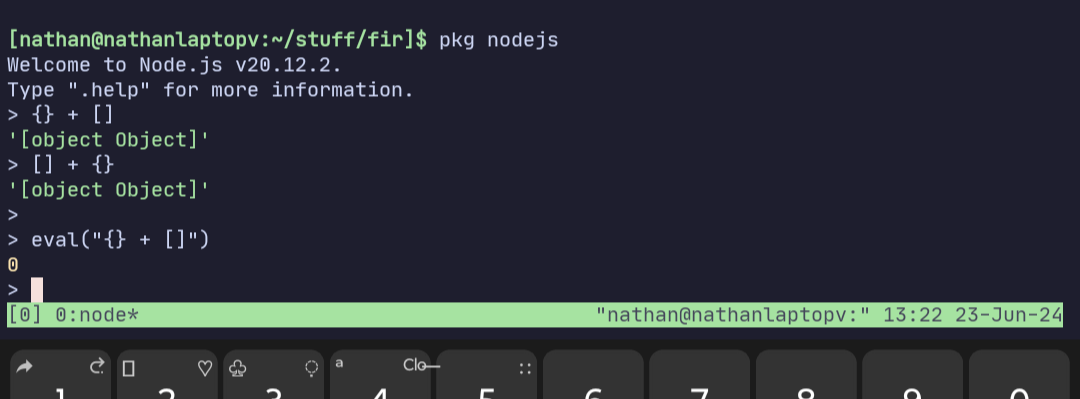In node, I get the same result in both cases. "[object Object]"
It’s calling the toString() method on both of them, which in the array case is the same as calling .join(",") on the array. For an empty array, that results in an empty string added to "[object Object]" at either end in the respective case in the picture.
Not sure how we’d get 0 though. Anybody know an implementation that does that? Browsers do that maybe? Which way is spec compliant? Number([]) is 0, and I think maybe it’s in the spec that the algorithm for type coercion includes an initial attempt to convert to Number before falling back to toString()? I dunno, this is all off the top of my head.
The inspector REPL evaluates as a statement-with-value (like eval), so the {} at the beginning is considered an empty block, not an object. This leaves +[], which is 0. I don’t know what would make Node differ, however.
Edit: Tested it myself. It seems Node prefers evaluating this as an expression when it can, but explicitly using eval gives the inspector behavior:
I thought IIFE’s usually looked like (function (...params) {})(...args). That’s not the latest way? To be honest I never used them much, at least not after arrow functions arrived.
In node, I get the same result in both cases.
"[object Object]"It’s calling the
toString()method on both of them, which in the array case is the same as calling.join(",")on the array. For an empty array, that results in an empty string added to"[object Object]"at either end in the respective case in the picture.Not sure how we’d get 0 though. Anybody know an implementation that does that? Browsers do that maybe? Which way is spec compliant?
Number([])is 0, and I think maybe it’s in the spec that the algorithm for type coercion includes an initial attempt to convert to Number before falling back totoString()? I dunno, this is all off the top of my head.The inspector REPL evaluates as a statement-with-value (like
eval), so the{}at the beginning is considered an empty block, not an object. This leaves+[], which is 0. I don’t know what would make Node differ, however.Edit: Tested it myself. It seems Node prefers evaluating this as an expression when it can, but explicitly using
evalgives the inspector behavior:So there’s yet another level of quirkery to this bullshit then, it seems. 😆 Nice digging! 🤝
I also noticed that if you surround the curlies with parentheses, you get the same again:
> eval('{} + []') 0 > eval('({}) + []') '[object Object]'Yep, parentheses force
{}to be interpreted as an expression rather than a block — same reason why IIFEs have!functioninstead of justfunction./me goes back to get second folding chair.
I thought IIFE’s usually looked like
(function (...params) {})(...args). That’s not the latest way? To be honest I never used them much, at least not after arrow functions arrived.